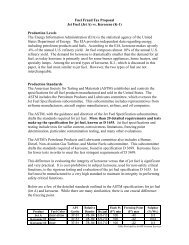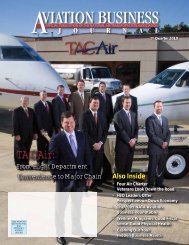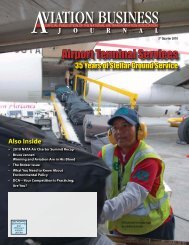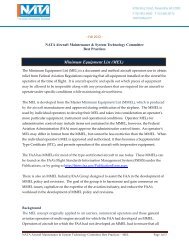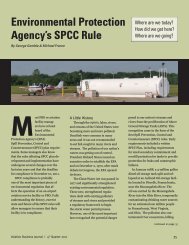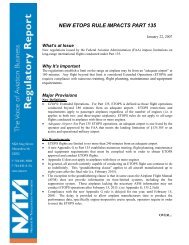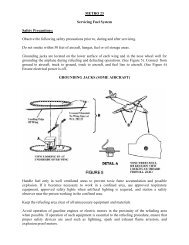Bridgeford Flying Services: A Vintage Napa Valley FBO You ... - NATA
Bridgeford Flying Services: A Vintage Napa Valley FBO You ... - NATA
Bridgeford Flying Services: A Vintage Napa Valley FBO You ... - NATA
You also want an ePaper? Increase the reach of your titles
YUMPU automatically turns print PDFs into web optimized ePapers that Google loves.
<strong>You</strong>’ve Been Served!<br />
Continued from page 22<br />
out again cheaply. In contrast,<br />
photocopying involves paying to<br />
both scan and print the document<br />
every time you want a copy.<br />
Once the documents are<br />
gathered, conduct a review<br />
for responsiveness and privilege.<br />
Depending on the size of<br />
your document collection, this<br />
could take some time. On the<br />
other hand, do you really want to<br />
cut corners and risk mistakenly<br />
producing a privileged document?<br />
Doing so could result in waiver of<br />
your privilege in all communications<br />
relating to the subject matter<br />
of the document.<br />
Prepare written responses<br />
and objections as appropriate.<br />
These could take the form of<br />
a letter to counsel or a pleading. A<br />
records custodian may also have<br />
to sign a declaration attesting to<br />
his or her search for responsive<br />
material.<br />
Electronically<br />
Stored Information<br />
ESI is a popular buzzword in the<br />
law right now, not the title of a TV<br />
series. Information stored in electronic<br />
formats is kept in all sorts<br />
of places, including personal computers,<br />
servers running scheduling<br />
programs, camera-phones, PDAs,<br />
voicemail, and video surveillance<br />
tapes. Under the federal civil procedure<br />
rules, a person responding<br />
to a subpoena need not provide<br />
electronically stored information<br />
from sources that are not “reasonably<br />
accessible” because of “undo<br />
burden.” For example, some electronically<br />
stored data may exist on<br />
systems so old that it cannot easily<br />
be converted into readable or<br />
usable form. However, a number<br />
of companies these days specialize<br />
in retrieving electronic data from<br />
media that has been corrupted or<br />
even “deleted” on purpose. Therefore,<br />
what a court will consider to<br />
be “reasonably accessible” ESI is a<br />
question that will depend on the<br />
facts of your specific case.<br />
The first important point to<br />
remember is to not take electronically<br />
stored information lightly. If<br />
you do not preserve discoverable<br />
electronic documents and data after<br />
receiving a subpoena, you may<br />
be found in contempt of court or<br />
liable for spoliation of evidence.<br />
Therefore, the second important<br />
point to remember is to develop<br />
a good data housekeeping plan<br />
before you receive a subpoena.<br />
Know what you have and where<br />
you have it. Designate someone<br />
who can provide information<br />
about where records are maintained,<br />
when they are destroyed,<br />
how they can be preserved, the<br />
formats used, past and present<br />
operating systems and software<br />
used, file-naming conventions,<br />
voicemail system usage, etc.<br />
Here is an example of the type<br />
of situation where specialized<br />
knowledge about ESI can help you<br />
comply with a court order. <strong>You</strong> realize<br />
that some documents responsive<br />
to a subpoena include old<br />
emails that you sent or received<br />
from your home computer back<br />
in the heyday of AOL mail. <strong>You</strong><br />
cannot find the emails, but a computer<br />
whiz may be able to retrieve<br />
copies of them. So far, so good.<br />
In reading through the retrieved<br />
messages you see references to<br />
email attachments like documents<br />
created in a word processor. Of<br />
course, the attachments are not<br />
“attached” anymore and, as luck<br />
would have it, constitute the very<br />
documents that the person who<br />
issued the subpoena is seeking.<br />
Could the attachments some day<br />
be found? Perhaps. Will they be<br />
readily accessible, or will retrieving<br />
them constitute an undue<br />
burden? The answers depend on<br />
the specifics involved. Will a court<br />
sanction you if you don’t produce<br />
them? I’ll have to plead the Fifth<br />
on this without additional information!<br />
For a profession that seems<br />
to be all about bright-line rules<br />
and precise language, lawyers<br />
can sound awfully mushy, right?<br />
Maybe.<br />
Postscript<br />
As we spoke, the airport owner<br />
seemed to relax a bit as it became<br />
obvious that subpoenas are not so<br />
daunting and mysterious after all.<br />
Responding to one presents challenges,<br />
but like other challenges<br />
in business and aviation, they can<br />
be managed with thoughtful advance<br />
preparation, a professional<br />
approach, and diligence. Hopefully<br />
the day will never come when<br />
you are served with a subpoena. If<br />
it does, don’t panic. Contact a professional,<br />
work out the problem,<br />
and then move on.<br />
Disclaimer: This article is intended<br />
to help you understand<br />
the nature of a subpoena and how<br />
to respond to one. It is a general<br />
reference guide only and does not<br />
constitute legal advice. Because<br />
applicable law varies among jurisdictions<br />
and every case is unique,<br />
it is important to consult with an<br />
attorney knowledgeable about litigation<br />
who can help you protect<br />
your rights.<br />
Paul Alp is an attorney with the<br />
law firm Crowell & Moring LLP in<br />
Washington D.C., where he directs<br />
the defense of complex multi-party<br />
civil cases in courts around the<br />
country. He also represents and<br />
counsels corporate aviation clients,<br />
charter operators, and <strong>FBO</strong>s in connection<br />
with litigation, regulatory<br />
compliance, and commercial transactions.<br />
Alp is a licensed commercial<br />
pilot and certified flight instructor.<br />
He can be contacted at<br />
palp@crowell.com.<br />
24 Aviation Business Journal | 2 nd Quarter 2008



